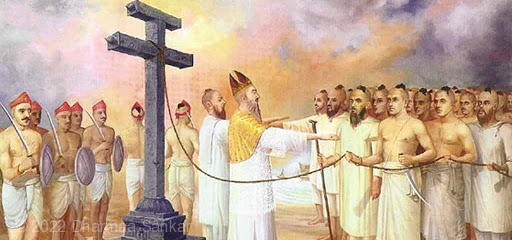St.Thomas Christians, also called “Mar Thoma Christians”, “Jewish Christians” or “Malabar Christians” are a Christian community who have traditionally lived in Kerala on the Malabar Coast in South Western India. These terms date back to the arrival of the first Europeans, Portuguese Missionaries and traders, who were surprised to see a thriving community of Christians outside of Europe and the Levant.
Local’s have usually called the community “Nasrani” which probably comes from the Aramaic term Nasraya – or “people from Nazarene”. Mar Thoma Christians believe they are the descendants of the original group of Nazarene tribes who made the journey with St.Thomas. Portuguese and later Dutch and Spanish missionaries who landed on the Malabar coast did not consider Nasrani Christians to be Christian and often used the term “Jewish Christian” pejoratively since many traditions and practices of our community like Pesaha (Passover) mirror those of the Jewish faith.
Conflict with Portuguese and the Coonan Cross Oath
The St Thomas Christians were in communion with the Church of the East in Mesopotamia from 52AD to 1599. Through this period, Although the bishops in the Levant remained spiritual leaders of the Syriac Rite, the Church of Malabar was always governed by an indigenous Archdeacon. However that changed with the arrival of the Portuguese missionaries in the 15th century who refused to accept the Syriac rite as legitimate Christianity and attempted to Latinise the Malabar Christians. They sought to bring the native St Thomas Christians under the Latin Padroado (bishop) in Goa. A series of Synods (Christian Councils) followed which each sought to replace more and more of our Syriac Rites with Latin Rites. The independence of the Malabar Syriac Church was gradually eroded over next 5 decades.
In 1652, a revered Syrian bishop called Ahtalah was on a visit to Malabar when he was kidnapped by Portuguese Jesuit Monks who placed him on a ship to be deported to Edessa in Turkey. Ahtalah never reached his destination and disappeared enroute. Ahtalah was never seen again. While some European historians claim he was deported to Lisbon where he spent the rest of his days in various prisons, a rumor spread across Malabar that the Portuguese priests had drowned the Syriac bishop off the coast of Kochi Island.
This rumor gained credence among the St Thomas Christian community and triggered a mass rebellion against the Portuguese clergy. The Thomas Christian clergy made one last attempt for rapprochement with the Catholic ArchBishop Garcia in Goa but the priests who went to meet him were arrested. This was the proverbial last straw.
On 3rd January 1653, a large congregation of Syriac Christians led by Archdeacon Thoma and protected by armed Malabar Christians assembled at St.Mary’s Church in Mattanchery. Standing in front of a hastily erected cross and touching the Syriac bible, the community took a solemn oath to never submit to Catholicism. The Cross was held in place with ropes by armed troops but it kept bending under the weight of the crowd hence the term – Coonan Kurishu Satyam – Oath of the Bent Cross.
After this Oath, only around 1000 Malabar Christians remained submissive to the Catholic Bishop. This community and their descendants are now called “Syrian Catholics” mainly native to Central Kerala. The remaining 300,000 strong St Thomas Christians migrated further South towards Travancore Kingdom where Portuguese influence was limited.
Contd… Legend of St Thomas


 Please wait...
Please wait...